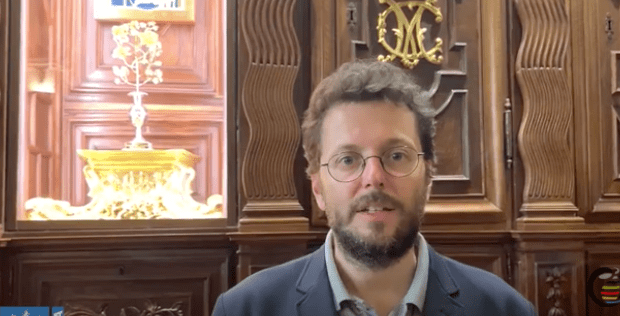The youngest new cardinal of the Church is also an exorcist: Bishop Giorgio Marengo, a 47-year-old Italian who works as a missionary bishop in faraway Mongolia, will officially become the “youngest cardinal” as of August 27.
In the consistory scheduled for that date, Pope Francis will hand over to him the well-known red zucchetto that symbolizes courage and willingness to suffer martyrdom for Christ if necessary.
A young missionary in very distant lands
In addition to his young age for the cardinalate—most cardinals are over 60—another “interesting fact” surrounding the young bishop has already been attracting attention among Catholics: the country in which he exercises his mission, Mongolia, has fewer than 1,500 Catholics.
Mongolian history is characterized by great isolation from Western influence. Among the population that declares itself religious, there’s a vast predominance of local indigenous traditions, especially shamanism: it has more than 10,000 adherents, more than six times as many as there are Catholics. Moreover, during the 20th century Mongolia suffered repression under the communist dictatorship, which formally prohibited religious worship.
The new cardinal, who belongs to the congregation of the Consolata Missionaries, said of his appointment as cardinal: “For me, living this new vocation means continuing on the path of littleness, humility, and dialogue.”
Young, but with long experience in the ministry of exorcism
Now another piece of information about Bishop Marengo is arousing curiosity among Catholics: the young bishop has been an exorcist for more than 20 years. And not only that: he’s a reference point among priests authorized to exercise the ministry of exorcism.
Bishop Marengo was one of the lecturers at the XVI edition of the Course on Exorcism and Prayer of Liberation, which is held annually at the Pontifical Athenaeum Regina Apostolorum in Rome. He had previously attended the same course as a student.
The bishop and future cardinal spoke on “The role of the bishop in the ministry of exorcism,” whether in Western cultures or in mission lands. In fact, he stated in his lecture that it’s common for non-Christian people to come to him asking him to deliver them “from the action of the devil,” which shows that they recognize the power of Christ’s ministers against the action of evil.
According to Bishop Marengo, the devil is “the divider who hinders our relationship with Christ,” while the Church promotes the relationship with Christ through the proclamation of the Gospel and sacramental action.
Superstitions as an obstacle to faith
According to the missionary bishop, people preparing for baptism in Mongolia suffer particular obstacles that reveal the action of the evil one, which diverts them towards ancestral practices incompatible with the Revelation of Christ. Bishop Marengo recalls that since the early days of the Church, this resistance has been common: Catholic priests need to repeat “the activity of Jesus’ disciples,” which “included casting out demons and healing the sick.”
It’s not only Mongolia, however, where there is the challenge of entrenched superstitions: for Bishop Marengo, the new paganization of societies worldwide is an indication of the devil’s action on souls to divert them from the Truth.
“The reason for the condemnation of superstitions is always the same and also applies to us today: these practices presuppose a lack of faith, and we resort to them to escape uncertainty,” says Bishop Marengo.
In contrast, Christ “trusts totally in the Father” and, “in the same way, the humility of those who believe in Christ presupposes total trust in Him.”
Five tips for fighting the devil
The future Cardinal Marengo highlighted 5 tips for fighting the devil:
1. “The main path is prayer. And in that realm, Eucharistic adoration and the different forms of Marian devotion stand out.” He asks for special attention to liturgical prayers with texts alluding to healing, always respecting the due liturgical norms. And, regarding Mongolia, he testifies: “Everything is changing after the spread of adoration of the Blessed Sacrament”.
2. “Adequate catechesis on the action of the devil and how to confront him.”
3. “Opportunities for sharing where issues of demonology can arise in dialogue.”
4. “Celebration of exorcism when necessary,” always respecting the norms of the Church.
5. “Formation of priests and religious regarding spiritual health and the fight against the devil.”

